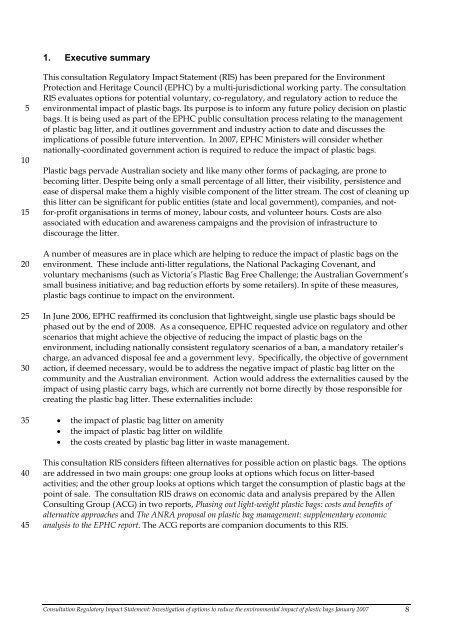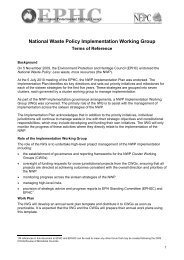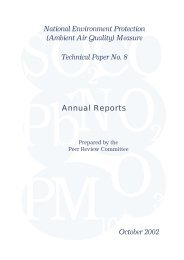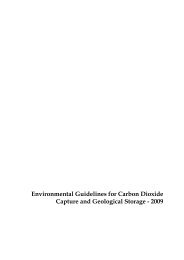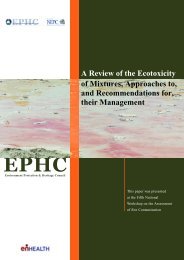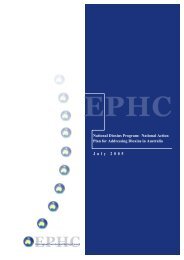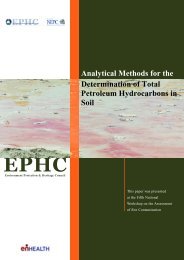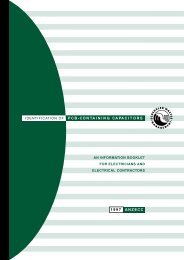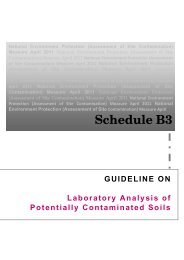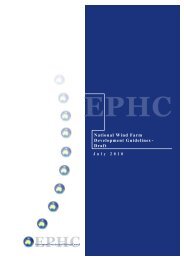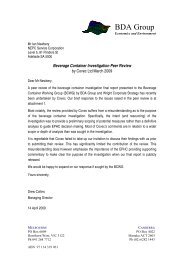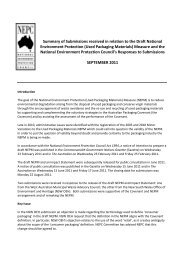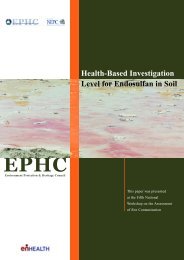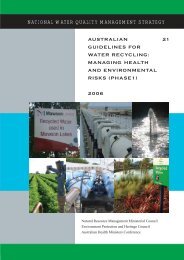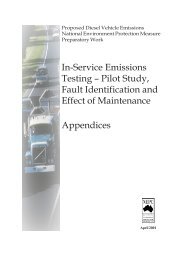Plastic Bags - COAG Standing Council on Environment and Water
Plastic Bags - COAG Standing Council on Environment and Water
Plastic Bags - COAG Standing Council on Environment and Water
Create successful ePaper yourself
Turn your PDF publications into a flip-book with our unique Google optimized e-Paper software.
1. Executive summary<br />
5<br />
10<br />
15<br />
20<br />
25<br />
30<br />
35<br />
40<br />
45<br />
This c<strong>on</strong>sultati<strong>on</strong> Regulatory Impact Statement (RIS) has been prepared for the Envir<strong>on</strong>ment<br />
Protecti<strong>on</strong> <strong>and</strong> Heritage <str<strong>on</strong>g>Council</str<strong>on</strong>g> (EPHC) by a multi-jurisdicti<strong>on</strong>al working party. The c<strong>on</strong>sultati<strong>on</strong><br />
RIS evaluates opti<strong>on</strong>s for potential voluntary, co-regulatory, <strong>and</strong> regulatory acti<strong>on</strong> to reduce the<br />
envir<strong>on</strong>mental impact of plastic bags. Its purpose is to inform any future policy decisi<strong>on</strong> <strong>on</strong> plastic<br />
bags. It is being used as part of the EPHC public c<strong>on</strong>sultati<strong>on</strong> process relating to the management<br />
of plastic bag litter, <strong>and</strong> it outlines government <strong>and</strong> industry acti<strong>on</strong> to date <strong>and</strong> discusses the<br />
implicati<strong>on</strong>s of possible future interventi<strong>on</strong>. In 2007, EPHC Ministers will c<strong>on</strong>sider whether<br />
nati<strong>on</strong>ally-coordinated government acti<strong>on</strong> is required to reduce the impact of plastic bags.<br />
<str<strong>on</strong>g>Plastic</str<strong>on</strong>g> bags pervade Australian society <strong>and</strong> like many other forms of packaging, are pr<strong>on</strong>e to<br />
becoming litter. Despite being <strong>on</strong>ly a small percentage of all litter, their visibility, persistence <strong>and</strong><br />
ease of dispersal make them a highly visible comp<strong>on</strong>ent of the litter stream. The cost of cleaning up<br />
this litter can be significant for public entities (state <strong>and</strong> local government), companies, <strong>and</strong> notfor-profit<br />
organisati<strong>on</strong>s in terms of m<strong>on</strong>ey, labour costs, <strong>and</strong> volunteer hours. Costs are also<br />
associated with educati<strong>on</strong> <strong>and</strong> awareness campaigns <strong>and</strong> the provisi<strong>on</strong> of infrastructure to<br />
discourage the litter.<br />
A number of measures are in place which are helping to reduce the impact of plastic bags <strong>on</strong> the<br />
envir<strong>on</strong>ment. These include anti-litter regulati<strong>on</strong>s, the Nati<strong>on</strong>al Packaging Covenant, <strong>and</strong><br />
voluntary mechanisms (such as Victoria’s <str<strong>on</strong>g>Plastic</str<strong>on</strong>g> Bag Free Challenge; the Australian Government’s<br />
small business initiative; <strong>and</strong> bag reducti<strong>on</strong> efforts by some retailers). In spite of these measures,<br />
plastic bags c<strong>on</strong>tinue to impact <strong>on</strong> the envir<strong>on</strong>ment.<br />
In June 2006, EPHC reaffirmed its c<strong>on</strong>clusi<strong>on</strong> that lightweight, single use plastic bags should be<br />
phased out by the end of 2008. As a c<strong>on</strong>sequence, EPHC requested advice <strong>on</strong> regulatory <strong>and</strong> other<br />
scenarios that might achieve the objective of reducing the impact of plastic bags <strong>on</strong> the<br />
envir<strong>on</strong>ment, including nati<strong>on</strong>ally c<strong>on</strong>sistent regulatory scenarios of a ban, a m<strong>and</strong>atory retailer’s<br />
charge, an advanced disposal fee <strong>and</strong> a government levy. Specifically, the objective of government<br />
acti<strong>on</strong>, if deemed necessary, would be to address the negative impact of plastic bag litter <strong>on</strong> the<br />
community <strong>and</strong> the Australian envir<strong>on</strong>ment. Acti<strong>on</strong> would address the externalities caused by the<br />
impact of using plastic carry bags, which are currently not borne directly by those resp<strong>on</strong>sible for<br />
creating the plastic bag litter. These externalities include:<br />
• the impact of plastic bag litter <strong>on</strong> amenity<br />
• the impact of plastic bag litter <strong>on</strong> wildlife<br />
• the costs created by plastic bag litter in waste management.<br />
This c<strong>on</strong>sultati<strong>on</strong> RIS c<strong>on</strong>siders fifteen alternatives for possible acti<strong>on</strong> <strong>on</strong> plastic bags. The opti<strong>on</strong>s<br />
are addressed in two main groups: <strong>on</strong>e group looks at opti<strong>on</strong>s which focus <strong>on</strong> litter-based<br />
activities; <strong>and</strong> the other group looks at opti<strong>on</strong>s which target the c<strong>on</strong>sumpti<strong>on</strong> of plastic bags at the<br />
point of sale. The c<strong>on</strong>sultati<strong>on</strong> RIS draws <strong>on</strong> ec<strong>on</strong>omic data <strong>and</strong> analysis prepared by the Allen<br />
C<strong>on</strong>sulting Group (ACG) in two reports, Phasing out light-weight plastic bags: costs <strong>and</strong> benefits of<br />
alternative approaches <strong>and</strong> The ANRA proposal <strong>on</strong> plastic bag management: supplementary ec<strong>on</strong>omic<br />
analysis to the EPHC report. The ACG reports are compani<strong>on</strong> documents to this RIS.<br />
C<strong>on</strong>sultati<strong>on</strong> Regulatory Impact Statement: Investigati<strong>on</strong> of opti<strong>on</strong>s to reduce the envir<strong>on</strong>mental impact of plastic bags January 2007 8


